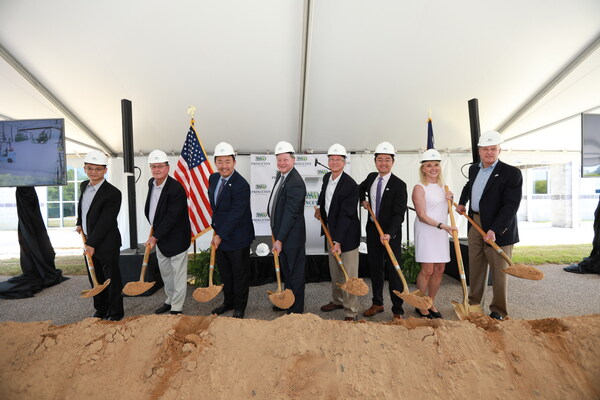Princeton NuEnergy Launches Flagship Facility in South Carolina
Nation’s first commercial-scale battery direct recycling manufacturing facility establishes disruptive technology in the United States
CHESTER COUNTY, S.C. and PRINCETON, N.J. , June 20, 2024 /PRNewswire/ — Princeton NuEnergy (PNE), a global leader in lithium-ion battery direct recycling, today broke ground on the nation’s first commercial-scale lithium-ion battery direct recycling facility. When complete, annual production is estimated at more than 10,000 tpa of battery-grade cathode material, equivalent to producing more than 100,000 batteries for EVs each year.

“We are pleased to welcome Princeton NuEnergy to Chester County and South Carolina. The company’s new operation will have a significant impact in the community by creating 41 new jobs and advancing our state’s alternative energy sector”, stated Governor Henry McMaster.
Developed from research started at Princeton University, PNE’s patented, low-temperature, plasma-assisted separation process (LPAS™) recovers more than 95 percent of lithium-ion materials found in all lithium-ion battery chemistries. PNE’s direct recycling process is significantly cleaner, faster, and less costly than traditional recycling or virgin cathode production.
Results from Argonne National Lab’s EverBatt model highlight that direct recycling of batteries to pristine OEM-equivalent cathode can deliver reductions up to 40 percent in cost and 70 percent in environmental waste. Direct recycling fundamentally improves battery manufacturing by reducing water consumption, eliminating toxic acid leaching, avoiding refining emissions and reducing CO2 emissions by up to 158,000 tonnes per annum (tpa) at 10,000 tpa production levels vs. cathode produced from virgin materials.
Today is a national milestone for America’s circular battery economy and brings the research incubated at Princeton University to market,” said Dr. Chao Yan, PNE’s founder and CEO. “South Carolina is an ideal location to lead the battery recycling revolution.”
A circular battery economy means materials stay in-country, from genesis to end-of-life recycling and remanufacturing. Battery feedstock comes from various consumer goods and industrial sources, including mobile phones and computers, batteries from children’s toys, electric vehicles, and industrial energy storage facilities.
Today’s announcement follows PNE closing a Series A round at $30 million, following investor demand for this substantially 50% over-subscribed round, adding Samsung Venture Investment Corporation as a strategic investor, and being listed by Time Magazine to “America’s Top Greentech Companies 2024”.
About Princeton NuEnergy
Princeton NuEnergy (PNE) is the leader in lithium-ion battery direct recycling, furthering America’s circular battery economy. Founded at Princeton University and named to Time Magazine’s “America’s Top Greentech Companies 2024” list, PNE is revolutionizing the critical materials supply chain with its patented direct recycling technology for lithium-ion batteries. PNE’s patented low-temperature plasma-assisted separation process (LPAS™) produces battery-grade cathode and anode materials suitable for direct reintroduction into cell manufacturing with reductions of up to 40 percent in cost and 70 percent in the environmental footprint over conventional methods. The company has received over $55 million in grants and strategic and venture funding, including investments from Honda Motor Co, Ltd., LKQ Corporation, Samsung Venture Investment Corporation, Wistron Corporation, and the U.S. Department of Energy. For more information, visit www.pnecycle.com.


